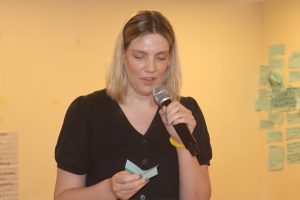Unveiling the Power of Dignified Menstruation: A Personal Account from a Workshop Experience in Nepal.
Written by Abigail Lennox: A Ph.D. Researcher affiliated with the University of East London (UEL) and the Economic Social and Research Council (ESRC).
Key Words
Dignified Menstruation | Menstruation Discrimination | Nepal
Introduction: A Journey into the Heart of Dignified Menstruation

The breaking dawn brought profound tranquillity, casting a peaceful spell over the jungle landscape of Nepal’s Chitwan, Bagmati province. Far removed from the bustling streets of metropolitan London, I found myself immersed in this serene world as if stepping into the pages of a captivating novel with a narrative yet to unfold.
While most people were embarking on their usual Sunday routines, I was embarking on a new journey, ignited by the passionate work of Radha Paudel, the driving force behind the Global South Coalition for Dignified Menstruation (GSCDM). As a researcher pursuing a Ph.D. focused on integrating a dignity lens into menstrual health dialogue, I discovered a kindred spirit in Radha—a visionary who shared my goal of reframing menstruation through the lens of dignity.
The more I delved into the initiatives of the GSCDM, the more captivated I became by their mission. An overwhelming desire to witness their work’s depth and breadth—to comprehend their mission’s triumphs and trials—ignited within me. I recognized that this experience could serve as a linchpin in strengthening my efforts to dismantle menstrual stigma in my homeland, the UK.
Embracing my enthusiasm, Radha graciously invited me to join her in Nepal. Merely a month later, I found myself in this enchanting country, ready to immerse myself in the transformative work of the GSCDM. In this piece, I aim to chronicle one aspect of my experience—a profound four-day “Training of Trainers on Dignified Menstruation” workshop—and share the invaluable lessons I gleaned from my time in Nepal.
Day One: Building Bonds and Breaking Barriers
Our first day was marked by a vibrant mix of participants – a blend of genders from contrasting backgrounds. Among them were NGO professionals deeply engrossed in combating menstruation-related issues and local advocates keen to learn and disseminate the principles of dignified menstruation.
The workshop started on a light note, with an icebreaker game to establish connections and create a conducive environment for intense conversations on menstrual discrimination. Which refers to taboos, shyness, restrictions, abuses, and violence associated with menstruation throughout the life cycle of menstruators (girls, women, transmen, queer). It is a form of sexual and gender-based violence and a violation of human rights (Global South Coalition for Dignified Menstruation, 2019). This innovative spin on the traditional ‘shopping list’ activity transformed the initial formal atmosphere into a vibrant space pulsating with laughter and fellowship. Remarkably, this introductory exercise took just 15 minutes to dissipate the formalities and anxieties, paving the way for sincere and candid discussions.
As the day proceeded, we engaged in an immersive meditation session followed by personal reflections on each participant’s first experience with menstruation. These narratives were raw, heartfelt, and eye-opening. They underscored the transformative power of introspection and the crucial need for personal examination to challenge and comprehend our own experiences and prejudices. The insights gained from these two exercises laid a solid foundation for the days to follow.
Day Two: Exploring the Spectrum of Menstrual Discrimination
On the second day of the workshop, we formed diverse teams to explore and map the broad spectrum of menstrual discrimination and practices prevalent in our respective communities. Through intensive discussions, we also delved deep into the fundamental concepts of dignified menstruation, emphasising the critical importance of accurately framing our language.
The subsequent spectacle that unfolded was genuinely heartwarming. Participants graciously corrected one another’s terminology throughout the remaining sessions, recognising the need for a shift in language and attitudes. Encouraging them to move away from the term ‘sanitary product’ and adopt the more appropriate ‘menstrual product’ showcased the transformative power of knowledge. It became evident that even with newfound understanding, dismantling deep-rooted stigmas and biases takes time and persistence. This collective effort served as a potent reminder that progress is achieved through continuous learning, unlearning, and the courage to challenge long-held beliefs.
Throughout the day, our exploration led us to a profound realization of how early menstrual discrimination infiltrates our consciousness. It was startling to discover that children aged six to nine begin forming their perspectives around menstruation. This understanding underscored the importance of providing appropriate education and guidance during the critical years before puberty. Without these resources, children accumulate biases and discrimination, and the divide between menstruators and non-menstruators widens. This revelation emphasized the need to reframe our menstrual life cycle understanding.
However, what struck me most profoundly was the common emotion that threaded through our diverse assembly. Despite our unique backgrounds, lived experiences, and individual narratives, a palpable undercurrent of shared pain surrounding menstruation resonated within each of us. These emotions were expressed through heartfelt discussions, raw testimonies, poignant poems, and soul-stirring songs. It became evident that a sense of fear—of embarrassment, something going wrong, or shame—persisted in our collective consciousness. This shared unease became the focal point of our discussions, highlighting our common humanity and the urgent need to address these fears. It reinforced the idea that to address menstruation discrimination effectively; we must examine it through the prism of dignity—a state of freedom from prejudice that encompasses stigma, taboos, abuse, and any violence associated with menstruation (Global South Coalition for Dignified Menstruation, 2019).
Day Three: Unravelling the Intersections and Inequalities of Menstruation
As day three of the workshop began, we were privileged to hear a profoundly personal account from Rinku, my translator. With unwavering courage, she shared her story of battling against menstrual discrimination and narrowly escaping the clutches of child marriage. Through her narrative, Rinku demonstrated remarkable fortitude in defying societal norms and showcased her determination to carve a path of freedom for herself.
Listening to Rinku’s story evoked a myriad of emotions within me. It served as a powerful reminder that many women, myself included, often take our freedom for granted. Her journey of emancipation not only set an inspiring precedent for her younger siblings but also sparked deep personal reflection. I found myself contemplating whether, if faced with the same circumstances, I would possess the same unwavering strength to defy my parents and cultural norms. Would I have the courage to choose freedom, even if it meant risking everything?
The discussions progressed to unravel the interconnectedness of menstrual discrimination with other forms of sexual and gender-based violence and human rights violations. We engaged in a compelling conversation about the often-overlooked intersection of menstruation and disability, shedding light on the unique challenges faced by menstruating individuals within the disability community.
The experiences shared during the workshop served as a reminder that dismantling oppressive systems requires collective effort and a commitment to promoting menstrual dignity for all. By challenging cultural norms, advocating for comprehensive education, and fostering open conversations, we can pave the way towards a world where menstruation is celebrated as a natural and normal part of life.
Day Four: Envisioning Solutions through a Lens of Dignity
Our final day focused on identifying critical solutions to address menstrual discrimination through the lens of dignity. A significant discussion revolved around Climate Justice and the potential of bio-degradable menstrual products as a sustainable pathway towards menstrual dignity. We examined the pioneering work of Miteri, the first bio-degradable menstrual product factory in Chitwan. We learned more about their various bio-degradable products, including single-use menstrual pads and reusable fabric pads that are eco-friendly and conveniently portable, fitting into a pocket. This represents a significant stride in promoting eco-friendly menstrual management.
Our exploration led us to the ‘3P’s’ model of Dignified Menstruation, which highlights the integral roles of ‘People,’ ‘Planet,’ and ‘Pocket.’ This approach emphasises the need to create a supportive, stigma-free society (People), encourage the use of environmentally sustainable menstrual products (Planet), and ensure that these products are affordable and accessible to all (Pocket).
As we approached the close of our intensive four-day journey, the final remarks were filled with a collective commitment to carry the learnings back to our homes and communities. Although the task may seem daunting, the transformation we witnessed over the past few days was remarkable.
The workshop concluded with a revealing pre and post-test evaluation, demonstrating a promising shift in mindset among all attendees. It was heartening to witness that everyone had substantially enhanced their understanding and were more equipped to debunk several prevalent myths surrounding menstruation within Nepali culture. This transformation served as a testament to the power of education and dialogue, underscoring our collective responsibility to further the movement towards dignified menstruation.
Conclusion: Carrying Forward the Torch of Dignified Menstruation

Reflecting on the workshop, I am filled with a profound sense of humility and inspiration. The experience has served as a poignant reminder that progress lies in our collective ability to break the walls of silence and shame surrounding menstruation. It has empowered us to acknowledge and confront the deep-rooted issue of menstrual discrimination.
Throughout the workshop, we delved into the intersections of menstrual health with various societal norms and challenges, such as child marriage, gender-based violence, disability rights, LGBTQIA+ rights, and climate justice. This exploration highlighted that menstrual health is not an isolated issue but a profoundly interconnected aspect of broader societal norms, values, and structures.
The journey we embarked upon during the workshop has expanded our understanding and ignited a collective flame of commitment to advance the discourse on dignified menstruation. As we return to our communities, we carry with us the seeds of change, promising to break the cycle of menstrual discrimination and pave the way for a future where dignity in menstrual health is not a distant ideal but a living reality.
However, it is vital to acknowledge the challenges that lie ahead. As we reintegrate into our personal lives and communities, we may encounter daily menstrual discrimination that reinforces stigma and shame. It will require resilience and determination to continue advocating for a dignified lens in the face of societal pressures.
Nevertheless, armed with the knowledge, experiences, and solidarity fostered during the workshop, we are equipped to be agents of change. We have the power to communicate the importance of dignity in menstruation, even in a world that often perpetuates stigma and discrimination. By sharing our insights, challenging societal norms, and engaging in open conversations, we can strive to create a more inclusive and compassionate society.
The journey towards dismantling menstrual discrimination is ongoing. Still, we are part of a larger movement united by a common purpose. Together, we can carry forward the torch of dignified menstruation, ensuring everyone is treated with dignity in their menstrual health experiences.
Reference
Global South Coalition for dignified menstruation (2023) Global South Coalition for dignified menstruation mission: 8th December. Available at: https://dignifiedmenstruation.org/mission2/#:~:text=State%20of%20free%20from%20any,of%20menstrurators%20within%20all%20identities. (Accessed: 10 June 2023).
